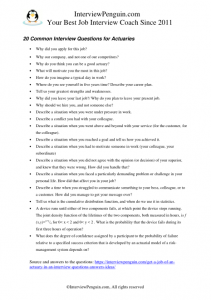Interesting job, clean working environment, and a salary that starts at $70,000 and has barely a limit. Most people do not even know that a position of an actuary exists. Yet it is one of the best jobs you can have, especially if you like finances, and are strong in math and statistics (* check also statistician interview questions).
The good news: You won’t face a tough competition in your interview. If you actually have an associate actuarial certification, you will enjoy a luxury of choice. Yes, companies will fight for you, trying to offer you the best working conditions, the best contract. But it takes many years to earn this certification. What when you have “only” a degree in Math, Economics, Statistics or Finance, and want to pursue this career?
You can still get a job of an actuary. But you will have to navigate your way through a tricky hiring process, which in this case consists typically in screening, behavioral, and final interview. Let’s have a look at each stage, the questions you will get, and how you can handle them.
Screening interview- who you are and what you want
Before they will even consider hiring you, and testing your skills and attitudes with behavioral and technical questions, they want to understand who you are, and what you want.
This is what screening interview is about–understanding your personality, whether you are a good fit for the job, your goals and dreams, your education and experience. Many insurance companies will conduct the screening interview over the phone, nevertheless, they may invite you for an in-person interview right from the get-go. The questions you may deal with include:
- Why did you apply for this job? Focus on the value you can bring to their team (education, strong analytical and statistical skills, experience, right attitude to work, passion for numbers, etc) rather than on the things you want to gain with this new job, things you want to take from them (great salary, recognition, plenty of employee benefits, etc).
- Why our company, and not one of our competitors? Try to point out something that makes them special. Perhaps they have the biggest market share in your country, an innovative approach to insurance, perhaps you like their products, or are a customer. One way or another, they should feel that you did your homework, that you know something about the company, and that they happen to be your first choice for employment (and insurance).
- Why do you think you can be a good actuary? Because you always excelled with numbers, because your scored great grades in statistics, and most importantly, because you enjoy risk assessment and doing things that actuaries typically do. Show some self-belief. If you do not believe in your skills, who else will?
- What will motivate you the most in this job? Try to speak about a sense of accomplishment. Belonging to a big international team. Having a direct impact on their thousands (or millions) of customers, since your calculations will reflect in the prices of final products. Whatever you go for, you should never say that money motivates you the most. You will earn a lot, no doubt, but it is better to avoid talking about money in the interviews.
- How do you imagine a typical day in work? You will use mathematics, statistics, and financial theory to assess the risk that an event will occur and help businesses and clients develop policies that minimize the cost of that risk. You will work with numbers, sit at the computer, and perform a lot of tedious tasks. Tell the hiring managers that you expect to be busy, that you count with a heavy workload, and look forward to start the job.
- Where do you see yourself in five years time? Describe your career plan.
- Tell us your greatest strengths and weaknesses.
- Why did you leave your last job?/ Why do you plan to leave your present job.
- Why should we hire you, and not someone else?
Behavioral Interview – what you think and how you’d act
Once you pass the initial screening interview, they will typically invite you to the company for a second step of the hiring process – the behavioral interview. In this case, you will deal mostly with questions that target your attitude to various situations that happen in a job of an actuary (many of them do actually happen in every job).
Your goal is to convince the hiring managers of your readiness for the job, and the right attitude to work, your colleagues, and to life in general. Let’s have a look at some questions.
- Describe a situation when you were under pressure in work. Working as an actuary, you will provide information and source materials for many other employees. And it won’t be always easy to deliver them on time. Show the hiring managers that you do not crack under pressure. Narrate a situation when you managed to prioritize your work, in order to meet a deadline.
- Describe a conflict you had with your colleague. Different people use different statistical methods, and the results of your calculations won’t necessarily mirror the results of other actuaries working for the company. Show the interviewers that you are not afraid of criticism, that you do not consider yourself the best mathematician in the world, and can admit making a mistake, or being wrong. Show them that you approach each conflict in a constructive way, and that the conflicts do not have a negative impact on the relationships you have with your colleagues.
- Describe a situation when you went above and beyond with your service (for the customer, for the colleague). The best employees do not mind going above and beyond for their colleagues, or the customers. Talk about something nice you did for another person–it doesn’t necessarily have to be something special, or unique. Perhaps you helped someone with their work, showed them the right direction, or served as an emotional support once they experienced difficult period in their person life.
- Tell me about a time when you had to work with someone to achieve a goal.
- Tell us about a time when you used logic to solve a problem.
- Describe a situation when you did not agree with the opinion (or decision) of your superior, and knew that they were wrong. How did you handle that?
- Tell us about a situation when you felt overwhelmed with work.
- Describe a time when you struggled to communicate something to your boss, colleague, or to a customer. How did you manage to get your message over?
- Describe a time when you faced an ethical dilemma at work.
- Tell us about an obstacle you overcame.
- Describe a situation when you struggled to meet a tight deadline.
Special Tip: Behavioral questions prevail in interviews in big corporations and insurance companies. If you are not sure how to deal with the questions from the list, or experience anxiety before the start of your interview, have a look at our Interview Success Package. Up to 7 premium answers to 31 most common behavioral interview questions will make your life much easier. Make sure that you won’t remain silent when they ask you their questions. Learn something others won’t know, outclass your competitors, and sign an amazing employment contract…
Technical questions – you won’t necessarily get them
Most people applying for any job in finance are afraid of technical questions. The truth is, however, that you may not get a single technical question in your interview. This is true for a few reasons:
- All banks and insurance companies provide excellent training to all new hires–if you apply for an entry level job, they will teach you everything you need to know.
- Many financial institutions trust the educational system (at least someone still trusts it :)). They believe that once you have a degree in Statistics, or in Finance, or once you got the certification, you will be ready to handle the technical aspect of the job (after the initial training, of course).
- Anyone can lead an interview with you. A senior actuary, but also a branch manager, or an HR generalist. The later two have no knowledge of the job of the actuary. They won’t ask you any technical questions, since they are unable to evaluate your answers to such questions…
In two out of three companies, you will face only personal and behavioral questions in your actuary interview. Only if a senior actuary interviews you for the job, or someone else who possesses strong knowledge of the field, will you deal with some technical questions. For example:
- Tell us what is the cumulative distribution function, and when do we use it in statistics.
- A device runs until either of two components fails, at which point the device stops running. The joint density function of the lifetimes of the two components, both measured in hours, is f (x,y)=x+y/4 for 0< x < 2 and 0< y < 2 . What is the probability that the device fails during its first three hours of operation?
- What does the degree of confidence assigned by a participant to the probability of failure relative to a specified success criterion that is developed by an actuarial model of a risk-management system depends on?
Conclusion and next steps
Actuary is a great career, especially for people who excel in statistics and risk assessment. While you won’t compete with many other applicants in your interview, you will have to demonstrate right personality for the job, and right attitude to various challenges and situations.
Hiring managers will test your personality and attitude with personal and behavioral questions. Practice with the list of questions, and think about a good answer to each one. And if you feel confused or anxious, have a look at out Interview Success Package, for excellent interview answers to each difficult question. Thank you!
* You can also download a full list of questions in .PDF format, to practice offline, before the start of your interview
May also interest you:
- Internal Auditor Interview Questions – Your skills and your personality will be tested in a tough interview (typically a four stage interview process). Can you show them that you have a great auditor in you?
- Allstate Insurance interview questions.
- Why do you want to work in finance?


